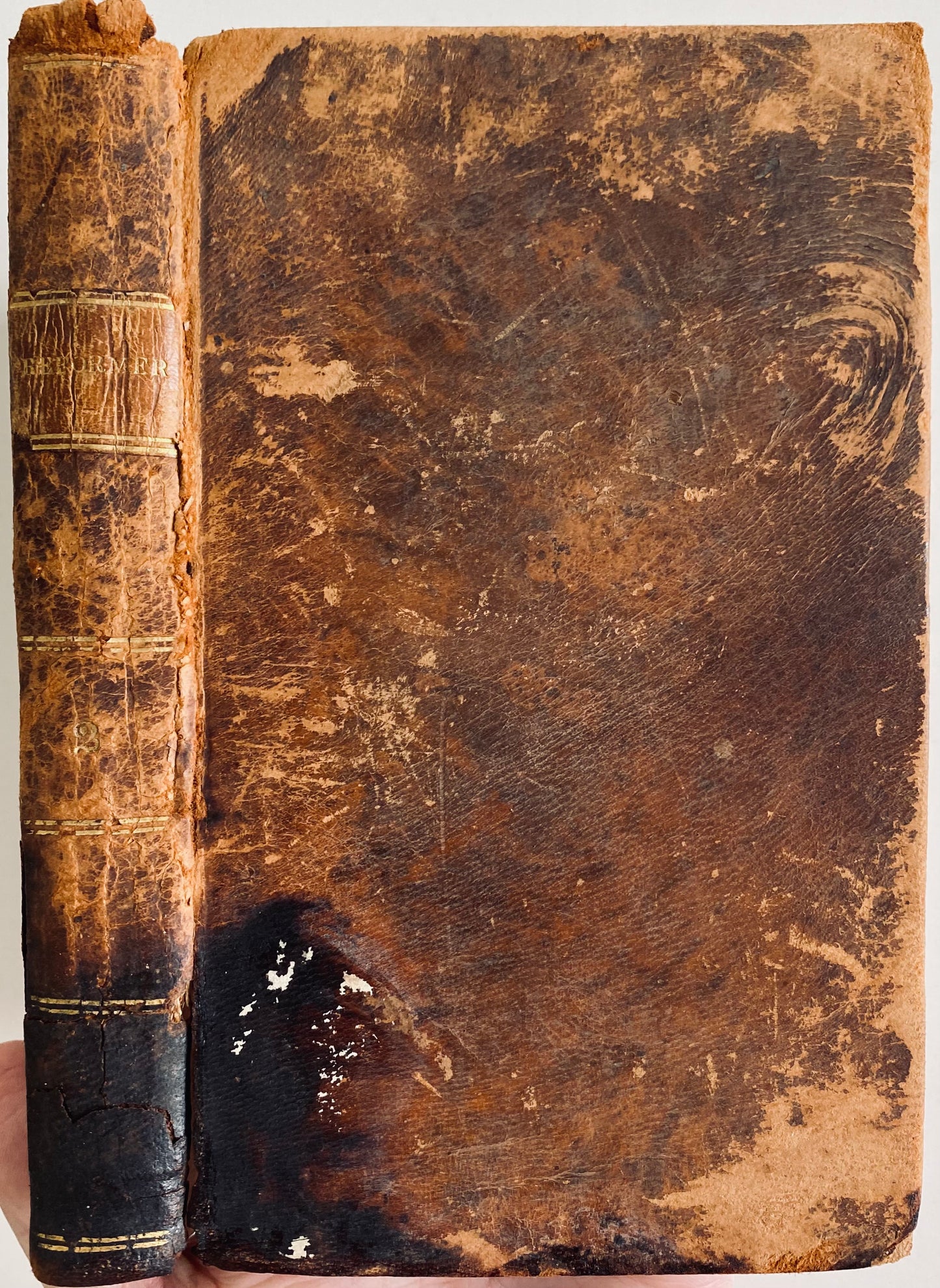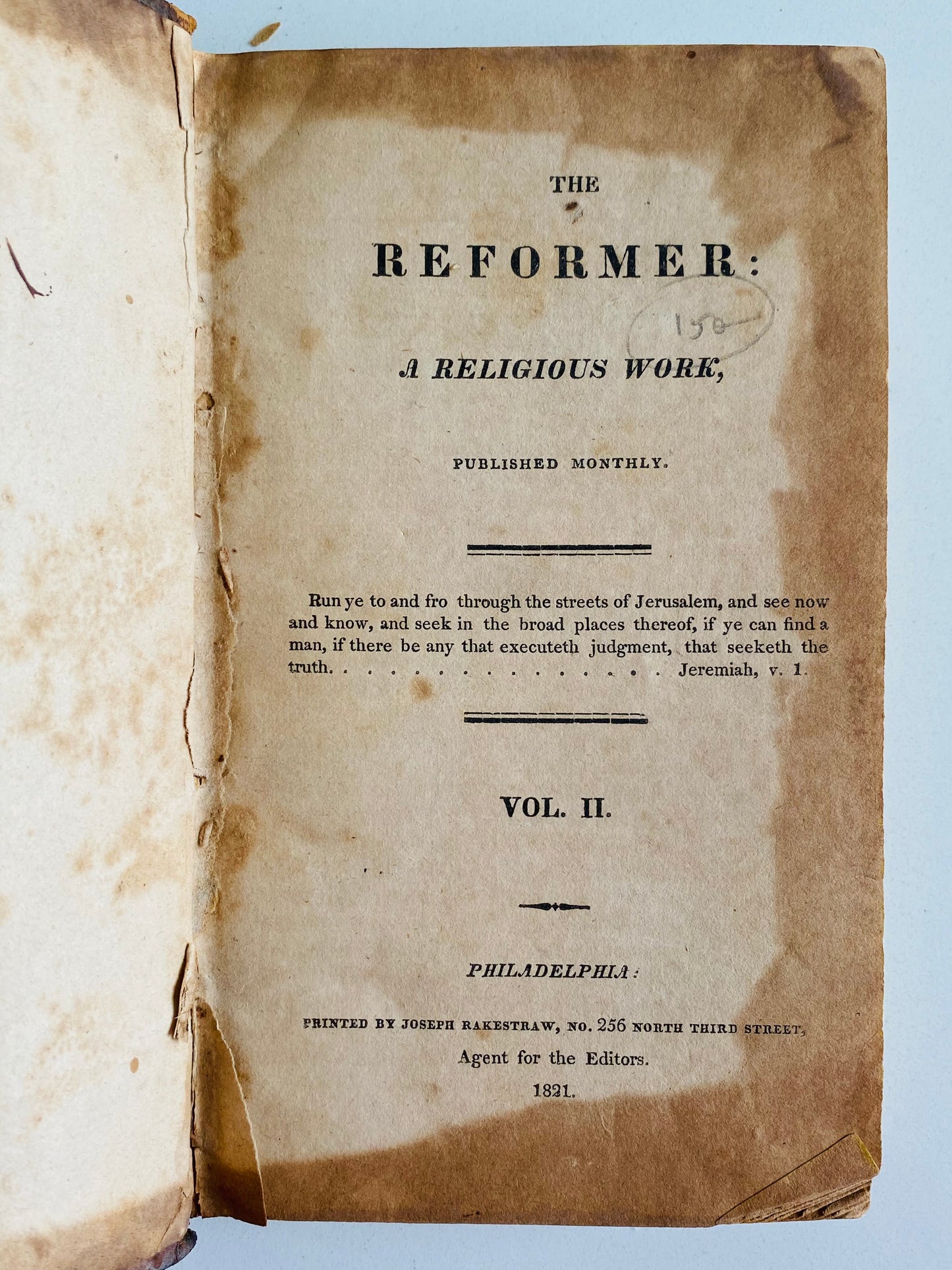Specs Fine Books
1821 THE REFORMER. Radical Millennial Free Love Periodical - Lambasts William Carey, Adoniram Judson.
1821 THE REFORMER. Radical Millennial Free Love Periodical - Lambasts William Carey, Adoniram Judson.
Couldn't load pickup availability
Fascinating and very rare entire year of Theophilus Ransom Gates' Reformer magazine.
As the peak of the Second Great Awakening was just barely in the rearview mirror, new movements began to appear, often radical in their views of sanctification, Christian practice, and theology [especially eschatology]. Gates was largely responsible for what was certainly one of the most unusual.
Gates was born in Hartland, Connecticut and began his adult life as a teacher, but would turn to itinerant preaching shortly thereafter. In 1810, he published, The Trials, Experiences, Exercises of Mind and First Travels of Theophilus R. Gates. In it, Gates lamented at the state of the world and the evil being preached from religious schools and seminaries. By combining two of his publications, The Reformer, and The Christian, into The Reformer and Christian, Gates began to comment on the changing tide that he saw the world experiencing, a tide that would bring about the thousand year millennium predicted in the Book of Revelations.
Not too far away, another religious radical, John Humphrey Noyes, together with his followers called Perfectionists, thought that the second coming had already occurred around the year 70. This allowed he and his followers to be "without sin" in this life. Gates began contributing to their newspaper and Noyes and Gates became sometimes enemies and sometimes partners in the millennial Kingdom work, ultimately forming two separate communities.
Shortly after the appearance of our volume, the complete unhingedness of Gates' views came into the public when he published, Battle Axe* and Weapons of War. In it, Gates declared marriage between men and women to be null and void because it only allowed for differences that were sure to come between them to remain so because of the bond they made together. He described marriage as a fight between a cat and a dog where one bites the other but out of tradition must stay together. Gates then declared that people were free from this, and allowed in any instant to show "free love" to another person without being bound to these "carnal" structures.
Gates would find an ally in Hannah Williamson, a young woman whom he met in Philadelphia, whose family owned a farm in rural Chester County. Gates and Williamson would cull together a small group of followers who practiced free love and chose “spouses” for a day or even a lifetime. Together they practiced “free love” in each other's households, abandoning all earthly laws and clothing, for Adam and Eve were perfect in the garden of Eden and did not require garments to cover themselves before they ate of the tree of knowledge. It was said that they plowed their fields and sowed their crops as if they were living in Eden, and often danced around wildly.
On November 6, 1846, the Public Ledger in Philadelphia announced that Theophilus Ransom Gates had died, much to the chagrin of his followers who expected heaven on earth to miraculously appear before them.
Gates, Theophilus R. [ed.] The Reformer. A Religious Work, Published Monthly. Vol. II. Philadelphia. Printed by Joseph Rakestraw. 1821. 284pp.
Original leather, rubbed, but solid and attractive. Clearly involved in a fire at some point at lower spine. Textually complete with some foxing and handling. Scarce. No other copies on the market
Contents include:
Opening editorial opining the deadening effects of then-current doctrinal orthodoxy and discussing hireling clergy [an oft-repeated theme is the avarice of missionaries and clergy who have raised their funds at the expense of the poor],
On the deadening effect of "scientific" religion as they note religion that is primarily doctrinally derived,
On the Constantinianization of the church, etc.,
Reproof of a new law in Virginia which makes it illegal to educate black children,
Revilings against the Methodists and their system of bishops and heavy-handed polity [though he seems to believe have some goodness about them],
An extensive and specific rebuke of a patriotic service held by Gardiner Spring at the
Brick Church in New York City, Extravagance in Meeting-Houses,
Modern Missionaries [again, extensive against missionaries in general and singling out the missionaries to India] by John Taylor of Kentucky,
Discussion of a law passed preventing ministers from educating slaves in South Carolina,
Evils of Calvinism,
Significant content from Quaker radical reformer Elias Hicks [who would have been equally unsettling as Gates, though in his own circles],
Letter from Red Jacket - Chief of the Senecas,
Law Religion,
Proceedings among the Baptists,
On Free Masonry [Series], Ministerial Accounts at the Great Day,
On False Prophets and How we may know them, etc. etc. etc.
Repeatedly in the sites of Gates are the missionaries at Burmah and Serampore [Directly accusing William Carey, Joshua Marshman, William Ward, Harriet Newell, Adoniram Judson, etc.,] who he lambasts with accusations of embezzlement, avarice, and greed.
Share






